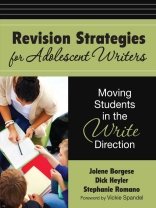Enlarge your repertoire of revision strategies!
For many secondary students, writing effectively is the most elusive of the critical literacy skills needed for college and career readiness. And for many teachers, revision is the most difficult part of the writing process to tackle. How can adolescent writers be guided to revisit their work, to identify the weaknesses in their writing drafts, and revise—making their pieces stronger and more effective? The Common Core State Standards advocate strengthening students′ writing through revision—a skill different from either drafting or editing—and using technology for creating and collaborating with others. This instructional guide, with its more than 30 flexible, classroom-tested strategies, demonstrates these practices and more:
- Frontloading (planning, rehearsing, and conversing before writing)
- Peer conferencing as part of a writers′ workshop
- Using technology to write, collaborate, and revise in and out of the classroom
- Modeling effective revision techniques as writers and teachers of writing
Teachers will turn again and again to this easy-to-use resource, with its clear explanations of strategies correlated to the 6 Traits of Effective Writing, examples of ‘before-and-after’ student work, and thoughtful quotes from published writers about their own writing and revision processes. These authors and experienced teachers of writing have provided a handbook that can be used immediately to scaffold students′ revision and help them become more fluent, confident, and independent writers.
Cuprins
Acknowledgements
Foreword
About the Authors
Introduction: The Need for Revision Strategies
Revision Throughout the Writing Process
Part I. Think from the Start: Begin with Frontloading Activities
1. Code the Text
2. Cut, Slash, and Burn
3. Create a Character Sketch
4. Create an Argument
5. Write an Effective Speech
Part II. Focus on Ideas
6. Use Anecdotes
7. Expand the Memory, Expand the Text
8. Guided Revising
9. Search for Details: The Hunt
10. Read and Rewrite
11. Add Specifics
Part III. Focus on Organization
12. A B C Revision
13. Organize a Feature Article
14. Try a Different Genre
15. Snip ′n′ Clip
16. Tally Up
Part IV. Focus on Voice, Word Choice, and Sentence Fluency
17. Create Authentic Voice
18. Write Less, Write More
19. Wordle
20. Sentence Fluency
21. Verbs! Get Some
Part V. Two Heads Are Better Than One: Peer Conference
22. SMART
23. Draw as a Way to Think and Revise
24. Marathon Writing
25. Pointing
Part VI. The Reading-Writing Connection: Consult Quality Literature
26. Once Upon a Time
27. And They Lived Happily Ever After
28. What Did You Say?
29. Paint a Picture with Words
30. Personification in Poetry
31. Write from Another Point of View
Part VII. Digital Communication by Nanci Werner-Burke
32. Vocabulary Exploration
33. Talk Before You Leap
34. All Together Now!
35. Give Me the Highlights
36. Picture This
List of Literature Cited
References
Index
Despre autor
Stephanie taught first and second grade where creative writing was a part of the language arts curriculum. She encouraged her students to be storytellers and write their stories down; not just Stephanie, but also her students and school community heard and saw the power of their stories through their authorship. Years later, Stephanie was offered a position as a reading specialist in a public school in Northeastern Pennsylvania. Her administration asked her to gain knowledge in the writing process so she could meld the reading-writing connection for her at-risk students. She participated in the Pennsylvania Writing Project at West Chester University where Jolene co-directed the project. Through her writing experiences, she realized the reciprocal relationship that writing is important to reading and reading is important to writing. As she worked with her at-risk readers and writers for over 20 years, she implemented the tools that her students needed to become more literate. Stephanie was appointed to a statewide steering committee commissioned by the governor to develop the Oral History Project, an authentic learning experience integrating the academic standards of reading, writing, speaking and listening. At the Governor’s Institutes in Pennsylvania, this project was attended by hundreds of teachers with the understanding that they would implement it in their classrooms. This project culminated in 2006 with the publishing of the book which Stephanie co-authored with colleagues Diane Skiffington Dickson, Dick Heyler, and Linda Reilly entitled The Oral History Project: Connecting Students to Their Community, Grades 4 – 8. She is the past president of the Keystone State Reading Association and is presently the editor of their newsletter, The Keystone Reader. Stephanie earned her doctorate of Education in Reading at Lehigh University and has recently retired from the Department of Reading Education at East Stroudsburg University, Pennsylvania.












